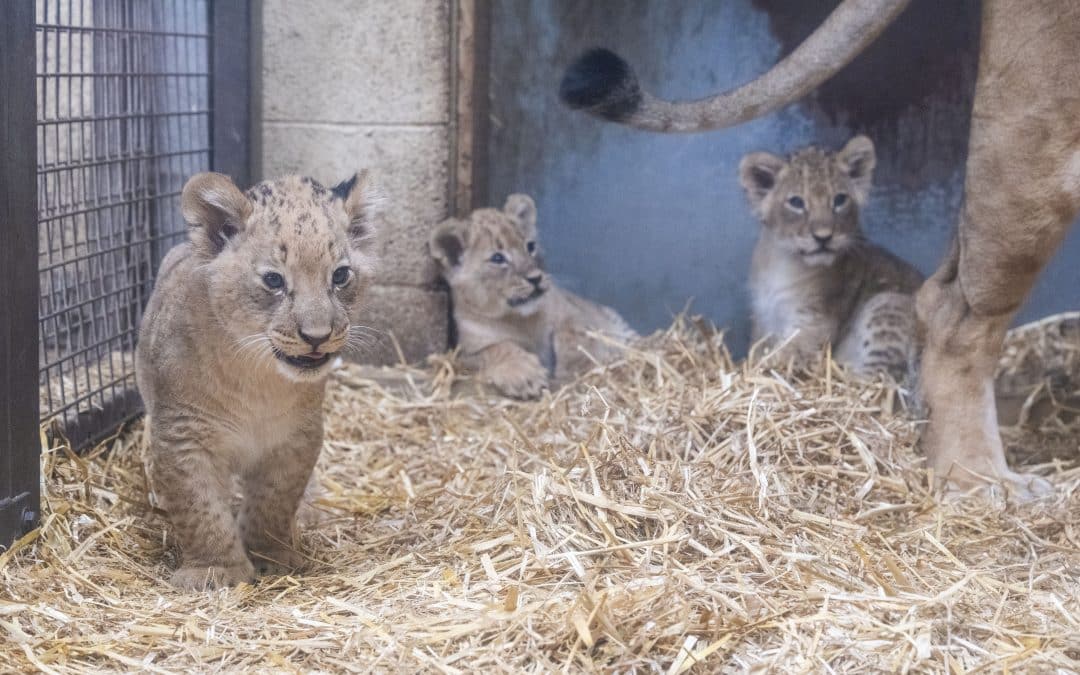The cat’s out the bag as keepers proudly announced the birth of three lion cubs.
The adorable trio arrived on 13 April 2025, to mum, 12-year-old Amber, so now, at just over eight-weeks-old, they have had their first health checks, confirming the sex of each cub.
The health check, carried out by our experienced veterinary team and keepers, confirmed that there are two boys and a girl, so keepers have chosen the names Nero, Nox and Nancy.
The trio of lion cubs continue a recent baby boom, following the birth of three Sumatran tiger cubs, an Indian rhino calf, two blesbok calves and one barasingha fawn.
Senior Carnivore Keeper, Shauna Jenkins, said, “Amber has been a fantastic mother after giving birth to her three cubs. We keepers try to be as hands-off as we can with animal births, so we initially monitored the cubs via CCTV to minimise the disturbance. It has been exciting to watch them reach crucial milestones in their development under Amber’s devoted care.
“As they’ve grown bigger and more active, the cubs have become increasingly playful, often seen using Amber as their climbing frame or her tail like a toy – particularly when she’s lying down to eat! Their unique personalities are beginning to emerge and we’re all eager to watch them to continue to grow and develop.”
She continued, “The female, Nancy, is already showing a strong independent streak, with her brothers often following her lead as they explore their environment and investigate new sights and smells. Amber is very relaxed with her cubs exploring, with keepers in the vicinity carrying out their routine husbandry tasks – a true reflection of the trust and bond she shares with the team.”
The next steps for the cubs will be an introduction to the outside world, with the keepers allowing them access to an outdoor area, next to the lion house.
While they are in this area, which is not viewable to the public, we will be sharing photos, videos and updates on our social media pages.
Just like a domestic cat, the lion cubs will need their second lot of injections and another health check before they are allowed to venture into the great outdoors to meet guests and explore their habitat on the Safari Drive this summer.
The birth of the cubs is significant, as lions are classed as ‘vulnerable’ in the wild by the IUCN (International Union for the Conservation of Nature).
Research & Conservation Officer, Katie McDonald, explained, “We are all so familiar with lions – they are the iconic animals of children’s stories and have been seen in zoos for centuries. It is hard to imagine that they could become extinct. Wild lions are hard to count but latest estimates (2023) indicate that there are between 22,000 and 25,000 adult and subadult lions left in Africa.
“It is believed lions exist in only about 6% of their historic range, demonstrating severe declines. This is due to lions losing habitat and prey animals to humans. As the human population in lion range areas increases, human-lion conflict is becoming more and more of a problem for both people and the cats. There are specific regional conservation strategies in place to save lions on the ground in Africa. Having lions at the Safari Park allows us to keep their story very much alive.”
All animals born at the Park this year will have names beginning with ‘N’, hence why all three cubs have names starting with this letter.
The rest of the pride can be seen on the Safari Drive, including the cubs’ dad, Tsavo and sister Hernatty.
The cubs’ big brothers, Hodge, Havoc and Harabi, can be seen with their half-brother Hercules on Lion Ridge, in the Safari Walk area of the Park.

